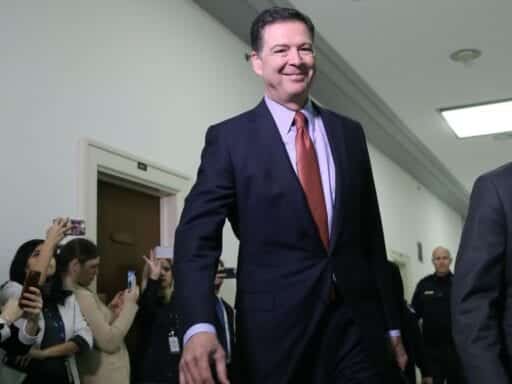The former FBI director said “any reasonable prosecutor” would file charges over certain incidents.
There’s “no doubt” that Donald Trump would have been charged with obstruction of justice if he wasn’t the president, former FBI Director James Comey said Thursday during a CNN town hall event.
Comey based his assessment on the facts laid out in special counsel Robert Mueller’s report, saying that certain incidents Mueller described were “examples that any reasonable prosecutor would charge,” and that it sure “looked like” Trump displayed corrupt intent.
It was Trump’s firing of Comey two years ago today that prompted the FBI to open its obstruction of justice investigation in the first place — and spurred the appointment of Mueller to take over that probe and the investigation of Russian interference with the 2016 election.
Mueller’s report examined 10 different episodes involving Trump that he thought raised potential obstruction of justice concerns, but he did not ultimately reach a conclusion on whether to charge the president. Attorney General William Barr decided not to, but more than 700 former federal prosecutors signed a public letter this week arguing that Mueller had enough evidence to indict Trump, saying that the only reason he didn’t do so was Trump is currently in office.
Some of those 10 incidents Mueller examined involved Comey personally — such as Trump’s request that Comey “let” an investigation of Michael Flynn “go,” and his eventual firing of Comey. But Comey said those weren’t the most concerning examples to him.
“I actually think the ones that would be most likely charged are not necessarily the ones that involved me,” Comey said. Instead, he signaled out two other actions by Trump as most concerning: his attempt to get White House counsel Don McGahn to initiate Mueller’s removal as special counsel, and his attempt to get then-Attorney General Jeff Sessions to restrict Mueller’s investigation.
Why Comey thought these two obstruction episodes were the most damning
1) Trump’s attempt to remove Mueller: On June 17, 2017, Trump called McGahn twice and said he should call Deputy Attorney General Rod Rosenstein. Trump wanted McGahn to tell Rosenstein that Robert Mueller shouldn’t remain in charge of the Russia investigation because of supposed “conflicts” (like a dispute over fees at a Trump golf course).
Per McGahn, Trump said things like, “You gotta do this,” “You gotta call Rod,” “Mueller has to go,” and “Call me back when you do it.” McGahn interpreted this as a presidential order to fire Mueller, and didn’t carry it out — preparing instead to resign.
This, Comey said, looked like a “flaming example” of “corrupt intent” on Trump’s part. Comey scoffed at claims — including those made by Barr while he testified in front of the Senate Judiciary Committee last week — that Trump was merely trying to get McGahn to convey concerns to Rosenstein. “Don McGahn called his lawyer, packed his office, and said he was going to quit. I don’t think that’s the reaction of the White House counsel when it’s about conveying concerns,” he said.
2) Trump’s attempt to have Sessions restrict Mueller’s investigation: Two days after those interactions between Trump and McGahn, the president met with Corey Lewandowski, his former campaign manager, in the Oval Office.
In the meeting, Trump dictated a statement he wanted Lewandowski to have then-Attorney General Sessions make publicly. Per Lewandowski’s notes, part of the message was:
“Our POTUS… is being treated very unfairly. He shouldn’t have a Special Prosecutor/Counsel b/c he hasn’t done anything wrong. I was on the campaign w/him for nine months, there were no Russians involved with him…
…Now a group of people want to subvert the Constitution of the United States. I am going to meet with the Special Prosecutor to explain this is very unfair and let the Special Prosecutor move forward with investigating election meddling for future elections…
In other words, Trump wanted Sessions to reverse his recusal from overseeing the Russia probe, and to announce that he was refocusing that probe to only pertain to “future elections” rather than 2016.
The following month, in July 2017, Trump followed up with Lewandowski, asked if he’d delivered the message — and even told Lewandowski he should tell Sessions that, if the attorney general wouldn’t take a meeting with him, he was fired.
All this was particularly shady because Lewandowski wasn’t even a US government official — Trump was trying to get to Sessions via a trusted ally on the outside. But it didn’t work — Lewandowski instead passed off the message to a White House aide, Rick Dearborn, and Dearborn never delivered it.
This episode, Comey said, was an example of one that “any reasonable prosecutor” would use as the basis for an obstruction of justice charge. That’s the reverse of the language Comey used in his famous statement explaining why Hillary Clinton wouldn’t be charged in connection with the investigation into her emails — that “no reasonable prosecutor would bring such a case.”
“The president is not above the law,” Comey said. “And I don’t accept the notion that because the president is the head of the executive branch he can’t ever obstruct justice in connection with executive branch activities. That’s just crazy and a recipe for lawlessness.”
Finally, Comey said that despite Barr’s judgment that nothing President Trump did rose to the level of criminal obstruction of justice, the Justice Department should “take a serious look at” charging Trump once he’s out of office.
“Whether that’s a wise thing to do to a former president,” Comey said, was a tougher question, and he wasn’t sure about the answer. But he said that, with respect to at least a couple of the episodes Mueller outlined, “it sure looks like” the evidence would be there to file charges.
Author: Andrew Prokop
Read More



